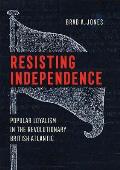Reviewing Resisting Independence
Benjamin Anderson just reviewed Brad A. Jones’s Resisting Independence: Popular Loyalism in the Revolutionary British Atlantic for H-Early America.
One can download the review in P.D.F. form here.
Jones doesn’t define Loyalists just as the people in colonial America who supported the Crown over local, Patriot authorities and, in many cases, left the thirteen breakaway colonies because of that.
Rather, this book studies people anywhere in the British Empire who chose the Crown over the Americans. Thus, Jones examined newspaper reports and essays from Glasgow, Halifax, Kingston, and New York City.
By this method, Jones sought to move beyond studies of individual Loyalists like Thomas Hutchinson and Jonathan Sewall, whose voluminous writings, both personal and public, let us trace their thinking and experiences.
Anderson seems to echo Jones’s argument that those newspaper reports, often anonymous, are “one of the very few places that a common colonist’s thoughts can be found.” However, while newspaper pages weren’t confined to the elite, they certainly learned toward the genteel. Anderson notes “Jones’s inability to bring African Americans and Native Americans into his analysis.”
Among the Loyalist writers he could access, Jones found they shared “a collection of Protestant Whig beliefs, ‘like free trade, political liberty, and religious freedom,’ and considered this representative monarchy to be the protector of liberty and Protestantism from Catholicism, France, and Spain.” That raises a couple of questions in my mind:
Anderson writes:
One can download the review in P.D.F. form here.
Jones doesn’t define Loyalists just as the people in colonial America who supported the Crown over local, Patriot authorities and, in many cases, left the thirteen breakaway colonies because of that.
Rather, this book studies people anywhere in the British Empire who chose the Crown over the Americans. Thus, Jones examined newspaper reports and essays from Glasgow, Halifax, Kingston, and New York City.
By this method, Jones sought to move beyond studies of individual Loyalists like Thomas Hutchinson and Jonathan Sewall, whose voluminous writings, both personal and public, let us trace their thinking and experiences.
Anderson seems to echo Jones’s argument that those newspaper reports, often anonymous, are “one of the very few places that a common colonist’s thoughts can be found.” However, while newspaper pages weren’t confined to the elite, they certainly learned toward the genteel. Anderson notes “Jones’s inability to bring African Americans and Native Americans into his analysis.”
Among the Loyalist writers he could access, Jones found they shared “a collection of Protestant Whig beliefs, ‘like free trade, political liberty, and religious freedom,’ and considered this representative monarchy to be the protector of liberty and Protestantism from Catholicism, France, and Spain.” That raises a couple of questions in my mind:
- Did these British subjects differ in those values from the American Patriots, or did almost all politically-minded Britons claim to be driven by “free trade, political liberty, and religious freedom”?
- How did Britons, both loyal and breakaway, deal with the contradictions between “free trade” and imperial mercantilism, “religious freedom” and anti-Catholicism, “political liberty” and community or national loyalty?
Anderson writes:
…he appears to argue that this Protestant Whig argument was the sole motivator in leading Loyalists to choosing their allegiance. He criticizes historians for focusing “on [the] Loyalists’ personal interest to describe their political allegiances” (p. 11); yet, self-interest is an intrinsic theme in Resisting Independence.The phrase “relatively new” seems to write out the Beardian approach to analyzing the Revolutionaries’ motivations, which is now over a century old and has never fully gone away.
In chapter 5, for example, he effectively demonstrates that local self-interests determined how the Loyalists reacted to the increasing tensions between the Patriots and Britain: Glasgow merchants recognized the profits they could gain from lucrative contracts to supply the British Army; white slave owners in Kingston saw Britain as their security against a slave rebellion on the island, thus ensuring their profits remained intact; and Haligonians saw the revolution as an opportunity to limit the authority of Nova Scotia’s unpopular governor. Only in New York, he explains, was there much more passionate support for British representative monarchy and Protestant Whig values because the Loyalists’ had experienced the Patriots’ violence firsthand.
Indeed, it seems there is an urge to treat political ideals and self-interest as two distinct motivations that were incapable of working in tandem with one another, but, in reality, this was not the case for many colonists. In Vermont, for example, Ethan Allen combined these Protestant Whig values with his own self-interests that lay in his land empire, which led him to open negotiations with the British Empire about Vermont returning to it.
The investigation of self-interest is a relatively new topic among historians of the American Revolution, who have predominantly confined their studies to towns and communities in New York and the southern backcountry that experienced multiple occupations by the Continental and British armies. Jones makes an excellent contribution to this field by elevating it from the North American colonies to the British Atlantic world.


No comments:
Post a Comment